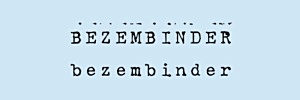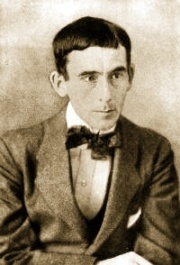Fleurs du Mal Magazine


Or see the index

Gedichten
Zonder titel
1
Deze hiërarchie van zichtbaarheid
doemt als een spiegel op uit diepte.
Geen tijd voor afleidingsmanoeuvres:
wie haar kennen moet kent haar.
2
Tot de hoogste macht verheven lijkt
dit vloeien tussen droom en stroom.
De Rijn verwijt niemand ooit iets.
Geen vijand kent water, is de regel.
Bert Bevers
Geschreven voor het poëzieproject in Millingen aan de Rijn, 2014
fleursdumal.nl magazine
More in: Archive A-B, Archive A-B, Bevers, Bert

Verzegelde tijd
Besefte jij het, dat in Зеркало
heden en verleden samenvielen,
als twee afzonderlijke werkelijk-
heden, bijna als twee oude zielen,
als dans van denken en amygdala,
op dat moment nog niet beseffend
dat een verstoorde scopofilia hen
uiteen zou drijven, de abstractie
het winnen zou van de intimiteit,
en het heden het verleden enkel
nog kennen zou in de verleden tijd?
Paul Bezembinder
Biografie: Paul Bezembinder studeerde theoretische natuurkunde in Nijmegen. In zijn poëzie zoekt hij in vooral klassieke versvormen en thema’s naar de balans tussen serieuze poëzie, pastiche en smartlap. Zijn gedichten (Nederlands) en vertalingen (Russisch-Nederlands) verschenen in verschillende (online) literaire tijdschriften. Voorbeelden van zijn werk zijn te vinden op zijn website, www.paulbezembinder.nl.
fleursdumal.nl magazine
More in: Archive A-B, Bezembinder, Paul, POETRY IN TRANSLATION: BEZEMBINDER

Italy versus England
With all its sinful doings, I must say,
That Italy’s a pleasant place to me,
Who love to see the sun shine every day,
And vines (not nailed to walls) from tree to tree
Festooned, much like the back scene of a play,
Or melodrame, which people flock to see,
When the first act is ended by a dance
In vineyards copied from the South of France.
I like on autumn evenings to ride out,
Without being forced to bid my groom be sure
My cloak is round his middle strapped about,
Because the skies are not the most secure ;
I know too that, if stopped upon my route,
Where the green alleys windingly allure,
Reeling with grapes red wagons choke the way.—
In England ’twould be dung, dust, or a dray.
I also like to dine on becaficas,
To see the sun set, sure he’ll rise to-morrow,
Not through a misty morning twinkling weak as
A drunken man’s dead eye in maudlin sorrow,
But with all Heaven to himself ; the day will break as
Beauteous as cloudless, nor be forced to borrow
That sort of farthing candlelight which glimmers
Where reeking London’s smoky cauldron simmers.
I love the language, that soft bastard Latin,
Which melts like kisses from a female mouth,
And sounds as if it should be writ on satin,
With syllables which breathe of the sweet South,
And gentle liquids gliding all so pat in,
That not a single accent seems uncouth,
Like our harsh northern whistling, grunting guttural,
Which we’re obliged to hiss, and spit, and sputter all.
I like the women too (forgive my folly!),
From the rich peasant cheek of ruddy bronze,
And large black eyes that flash on you a volley
Of rays that say a thousand things at once,
To the high Dama’s brow, more melancholy,
But clear, and with a wild and liquid glance,
Heart on her lips, and soul within her eyes,
Soft as her clime, and sunny as her skies.
Eve of the land which still is Paradise !
Italian Beauty ! didst thou not inspire
Raphael, who died in thy embrace, and vies
With all we know of Heaven, or can desire,
In what he had bequeathed us ?—in what guise,
Though flashing from the fervour of the lyre,
Would words described thy past and present glow,
While yet Canova can create below ?
‘England ! with all thy faults I love thee still’,
I said at Calais, and have not forgot it ;
I like to speak and lucubrate my fill ;
I like the government (but that is not it) ;
I like the freedom of the press and quill ;
I like the Habeas Corpus (when we’ve got it) ;
I like a Parliamentary debate,
Particularly when ’tis not too late ;
I like the taxes, when they’re not too many ;
I like a seacoal fire, when not too dear ;
I like a beef-steak, too, as well as any ;
Have no objection to a pot of beer ;
I like the weather,—when it is not rainy,
That is, I like two months of every year.
And so God save the Regent, Church, and King !
Which means that I like all and every thing.
Our standing army, and disbanded seamen,
Poor’s rate, Reform, my own, the nation’s debt,
Our little riots just to show we’re free men,
Our trifling bankruptcies in the Gazette,
Our cloudy climate, and our chilly women,
All these I can forgive, and those forget,
And greatly venerate our recent glories,
And wish they were not owing to the Tories.
Lord Byron (1788-1824)
Italy versus England
fleursdumal.nl magazine
More in: Archive A-B, Byron, Lord

Aleksandr Blok
(1880–1921)
De stad, de straat
De stad, de straat, de lamp, de zaak,
Bevroren is het duister, zinloos licht.
Al overleef je nog zo, nog zo vaak,
Het is zoals het is. De deur zit dicht.
Je sterft, staat op, en doet alsof je lacht,
Je wereldje hervindt zijn stille kramp:
Het vastgevroren water van de nacht,
De stad, de straat, de zaak, de lamp.
Aleksandr Blok, Ночь, улица… , 1912
Vertaling Paul Bezembinder 2016
Paul Bezembinder: zijn gedichten en vertalingen verschenen in verschillende (online) literaire tijdschriften. Zie meer op zijn website: www.paulbezembinder.nl
fleursdumal.nl magazine
More in: Archive A-B, Blok, Blok, Aleksandr

Sieben schizophrene Sonette
1. Der grüne König
Wir, Johann, Amadeus Adelgreif,
Fürst von Saprunt und beiderlei Smeraldis,
Erzkaiser über allen Unterschleif
Und Obersäckelmeister vom Schmalkaldis
Erheben unsern grimmen Löwenschweif
Und dekretieren vor den leeren Saldis:
“Ihr Räuberhorden, eure Zeit ist reif.
Die Hahnenfeder ab, ihr Garibaldis.
Man sammle alle Blätter unserer Wälder
Und stanze Gold daraus, soviel man mag,
Das ausgedehnte Land braucht neue Gelder.
Und eine Hungersnot liegt klar am Tag.
Sofort versehe man die Schatzbehälter
Mit Blattgold aus dem nächsten Buchenschlag.”
2. Die Erfindung
Als ich zum ersten Male diesen Narren
Mein neues Totenwäglein vorgeführt,
War alle Welt im Leichenhaus gerührt
Von ihren Selbstportraits und anderen Schmarren.
Sie sagten mir: nun wohl, das sei ein Karren,
Jedoch die Räder seien nicht geschmiert,
Auch sei es innen nicht genug verziert
Und schließlich wollten sie mich selbst verscharren.
Sie haben von der Sache nichts begriffen,
Als daß es wurmig zugeht im Geliege
Und wenn ich mich vor Lachen jetzt noch biege,
So ist es, weil sie drum herum gestanden,
Die Pfeife rauchten und den Mut nicht fanden,
Hineinzusteigen in die schwarze Wiege.
3. Der Dorfdadaist
In Schnabelschuhen und im Schnürkorsett
Hat er den Winter überstanden,
Als Schlangenmensch im Teufelskabinett
Gastierte er bei Vorstadtdilettanten.
Nun sich der Frühling wieder eingestellt
Und Frau Natura kräftig promenierte,
Hat ihn die Lappen- und Attrappenwelt
Verdrossen erst und schließlich degoutieret.
Er hat sich eine Laute aufgezimmert
Aus Kistenholz und langen Schneckenschrauben,
Die Saiten rasseln und die Stimme wimmert,
Doch läßt er sich die Illusion nicht rauben.
Er brüllt und johlt, als hinge er am Spieße.
Er schwenkt jucheiend seinen Brautzylinder.
Als Schellenkönig tanzt er auf der Wiese
Zum Purzelbaum der Narren und der Kinder.
4. Der Schizophrene
Ein Opfer der Zerstückung, ganz besessen
Bin ich – wie nennt ihr’s doch? – ein Schizophrene.
Ihr wollt, daß ich verschwinde von der Szene,
Um euren eigenen Anblick zu vergessen.
Ich aber werde eure Worte pressen
In des Sonettes dunkle Kantilene.
Es haben meine ätzenden Arsene
Das Blut euch bis zum Herzen schon durchmessen.
Des Tages Licht und der Gewohnheit Dauer
Behüten euch mit einer sichern Mauer
Vor meinem Aberwitz und grellem Wahne.
Doch plötzlich überfällt auch euch die Trauer.
Es rüttelt euch ein unterirdischer Schauer
Und ihr zergeht im Schwunge meiner Fahne.
5. Das Gespenst
Gewöhnlich kommt es, wenn die Lichter brennen.
Es poltert mit den Tellern und den Tassen.
Auf roten Schuhen schlurrt es in den nassen
Geschwenkten Nächten und man hört sein Flennen.
Von Zeit zu Zeit scheint es umherzurennen
Mit Trumpf, Atout und ausgespielten Assen.
Auf Seil und Räder scheint es aufzupassen
Und ist an seinem Lärmen zu erkennen.
Es ist beschäftigt in der Gängelschwemme
Und hochweis weht dann seine erzene Haube,
Auf seinen Fingern zittern Hahnenkämme,
Mit schrillen Glocken kugelt es im Staube.
Dann reißen plötzlich alle wehen Dämme
Und aus der Kuckucksuhr tritt eine Taube.
6. Der Pasquillant
Auch konnt es unserm Scharfsinn nicht entgehen,
Daß ein Herr Geist uns zu bemäkeln pflegt,
Indem er ein Pasquill zusammenträgt,
Das ihm die Winde um die Ohren säen.
Bald kritzelt er, bald hüpft er aufgeregt
Um uns herum, dann bleibt er zuckend stehen
Und reckt den Schwartenhals, um zu erspähen,
Was sich in unserm Kabinett bewegt.
Den Bleistiftstummel hat er ganz zerbissen,
Die Drillichnaht ist hinten aufgeschlissen,
Doch dünkt er sich ein Diplomatenjäger.
De fakto dient bewußter Schlingenleger
Dem Kastellan als Flur- und Straßenfeger
Und hat das Recht die Kübel auszugießen.
7. Intermezzo
Ich bin der große Gaukler Vauvert.
In hundert Flammen lauf ich einher.
Ich knie vor den Altären aus Sand,
Violette Sterne trägt mein Gewand.
Aus meinem Mund geht die Zeit hervor,
Die Menschen umfaß ich mit Auge und Ohr.
Ich bin aus dem Abgrund der falsche Prophet,
Der hinter den Rädern der Sonne steht.
Aus dem Meere, beschworen von dunkler Trompete,
Flieg ich im Dunste der Lügengebete.
Das Tympanum schlag ich mit großem Schall.
Ich hüte die Leichen im Wasserfall.
Ich bin der Geheimnisse lächelnder Ketzer,
Ein Buchstabenkönig und Alleszerschwätzer.
Hysteria clemens hab ich besungen
In jeder Gestalt ihrer Ausschweifungen.
Ein Spötter, ein Dichter, ein Literat
Streu ich der Worte verfängliche Saat.
Hugo Ball
(1886-1927)
Sieben schizophrene Sonette
fleursdumal.nl magazine
More in: Archive A-B, Ball, Hugo, DADA, Dada, Dadaïsme

Pierre-Jean de Béranger
Beaucoup d’amour
Malgré la voix de la sagesse,
Je voudrais amasser de l’or :
Soudain aux pieds de ma maîtresse
J’irais déposer mon trésor.
Adèle, à ton moindre caprice
Je satisferais chaque jour.
Non, non, je n’ai point d’avarice,
Mais j’ai beaucoup, beaucoup d’amour.
Pour immortaliser Adèle,
Si des chants m’étaient inspirés,
Mes vers, où je ne peindrais qu’elle,
A jamais seraient admirés.
Puissent ainsi dans la mémoire
Nos deux noms se graver un jour !
Je n’ai point l’amour de la gloire,
Mais j’ai beaucoup, beaucoup d’amour.
Que la Providence m’élève
Jusqu’au trône éclatant des rois,
Adèle embellira ce rêve :
Je lui céderai tout mes droits.
Pour être plus sûr de lui plaire,
Je voudrais me voir une cour.
D’ambition je n’en ai guère,
Mais j’ai beaucoup, beaucoup d’amour.
Mais quel vain désir m’importune ?
Adèle comble tous mes vœux.
L’éclat, le renom, la fortune,
Moins que l’amour rendent heureux.
A mon bonheur je puis donc croire,
Et du sort braver le retour !
Je n’ai ni bien, ni rang, ni gloire,
Mais j’ai beaucoup, beaucoup d’amour.
Pierre-Jean de Béranger (1780-1857)
Beaucoup d’amour
Toutes les chansons de Béranger (1843)
fleursdumal.nl magazine
More in: Archive A-B, Béranger, Pierre-Jean de

Robert Bridges
I have loved flowers that fade,
Within whose magic tents
Rich hues have marriage made
With sweet unmemoried scents:
A honeymoon delight,
A joy of love at sight,
That ages in an hour
My song be like a flower!.
I have loved airs that die
Before their charm is writ
Along a liquid sky
Trembling to welcome it.
Notes, that with pulse of fire
Proclaim the spirit’s desire,
Then die, and are nowhere
My song be like an air!.
Die, song, die like a breath,
And wither as a bloom;
Fear not a flowery death,
Dread not an airy tomb!
Fly with delight, fly hence!
‘Twas thine love’s tender sense
To feast; now on thy bier
Beauty shall shed a tear.
Robert Seymour Bridges (1844 – 1930)
I have loved flowers that fade
fleursdumal.nl magazine
More in: Archive A-B, Bridges, Robert

Innokenti Annenski
(1855–1909)
Van de sterren …
Van de sterren glinsterend en stil
is er één die ik van naam goed ken,
niet omdat ik van haar houden wil,
maar bij andere steeds droevig ben.
Als ik mij in twijfel tot haar richt,
vraag ik háár naar wat er nodig is,
niet omdat zij dan de nacht verlicht,
maar bij haar het licht niet nodig is.
Innokenti Annenski, Среди миров, 1901
Vertaling Paul Bezembinder, 2017
Paul Bezembinder: zijn gedichten en vertalingen verschenen in verschillende (online) literaire tijdschriften. Zie meer op zijn website: www.paulbezembinder.nl
fleursdumal.nl magazine
More in: Annenski, Annenski, Innokenti, Archive A-B

Wolken
elomen elomen lefitalominal
wolminuscaio
baumbala bunga
acycam glastula feirofim flinsi
elominuscula pluplubasch
rallalalaio
endremin saxassa flumen flobollala
feilobasch falljada follidi
flumbasch
cerobadadrada
gragluda gligloda glodasch
gluglamen gloglada gleroda glandridi
elomen elomen lefitalominai
wolminuscaio
baumbala bunga
acycam glastala feirofim blisti
elominuscula pluplusch
rallabataio
Hugo Ball
(1886-1927)
Wolken
fleursdumal.nl magazine
More in: Archive A-B, Ball, Hugo, Dada, DADA, Dadaïsme

Picasso’s bicycle
The clutter was busy with itself,
dusty, rusty bits of calloused iron
struggled in the dinosaur maxim
of becoming dead skeletons
at the end of a so-so utilitarian life.
The effeminate ballroom
was not far behind, peeling
paint and whimpering plaster
on stained alabaster flooring,
the dream of luxury expiring.
The ghost of a danced waltz
in a Fin de Siècle stench spewed
to the vibration of tuneless strings.
Cobweb filled champagne bottles
sipped by drunk working class guests,
parched their sandy mouths thirsty.
The dirt filled the building slowly
travelling illegally on the back
of the Sirocco from the Levant
to leave an arid skin on every surface.
The walls bleached and blistered,
the fascias cracked and crumbled,
the Republic surrendered easily
to the upstart Spaniard’s charms
and chivvied slices of glory for him
in the ruined hypocrisy of its noblesse.
His work attested to a fall in standards
in slices of past glory, all ideas stolen
by the old devil’s goat-like desires.
The scrapyard sniggered in contempt
at the old fool, and the camera stared.
03.02.11
Vincent Berquez
Vincent Berquez is a London–based artist and poet
fleursdumal.nl magazine
More in: Archive A-B, Berquez, Vincent, Pablo Picasso, Vincent Berquez

Haikoe
Voor de bomen blij
ben ik dat het weer regent
en er achter ook
Bert Bevers
Uit: Onaangepaste tijden,
Zinderend, Bergen op Zoom, 2006
Bert Bevers is a poet and writer who lives and works in Antwerp (Be)
fleursdumal.nl magazine
More in: Archive A-B, Bevers, Bert

Verse ohne Worte
gadji beri bimba glandridi laula lonni cadori
gadjama gramma berida bimbala glandri galassassa laulitalomini
gadji beri bin blassa glassala laula lonni cadorsu sassala bim
gadjama tuffm i zimzalla binban gligla wowolimai bin beri ban
o katalominai rhinozerossola hopsamen laulitalomini hoooo
gadjama rhinozerossola hopsamen
bluku terullala blaulala loooo
zimzim urullala zimzim urullala zimzim zanzibar zimzalla zam
elifantolim brussala bulomen brussala bulomen tromtata
velo da bang bang affalo purzamai affalo purzamai lengado tor
gadjama bimbalo glandridi glassala zingtata pimpalo ögrögöööö
viola laxato viola zimbrabim viola uli paluji malooo
tuffm im zimbrabim negramai bumbalo negramai bumbalo tuffm i zim
gadjama bimbala oo beri gadjama gaga di gadjama affalo pinx
gaga di bumbalo bumbalo gadjamen
gaga di bling blong
gaga blung
Hugo Ball
(1886-1927)
Verse ohne Worte
fleursdumal.nl magazine
More in: Archive A-B, Ball, Hugo, Dada, DADA, Dadaïsme
Thank you for reading Fleurs du Mal - magazine for art & literature